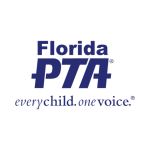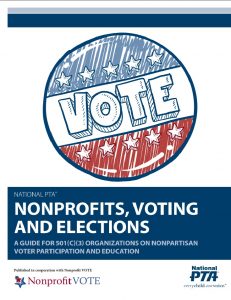A GUIDE FOR THE PTA ADVOCATE
WHAT IS ADVOCACY?
In the context of PTA, Advocacy is support and speaking up for children – in schools, in communities, and before government bodies and other organizations that make decisions affecting children.
Those who choose to lobby, to take their case directly to their elected representatives, represent one very important form of advocacy called “grassroots advocacy.”
It is your right to lobby.
Some would say it is your responsibility.
Why?
BECAUSE YOU CAN MAKE A DIFFERENCE!
LOBBYING
There are certain traits that are essential to functioning successfully in the legislative environment.
First and foremost, BE TRUTHFUL. You do not want to jeopardize your credibility in any way. Therefore, do not be tempted to embellish the materials you present to legislators or to exaggerate your “facts” in testimony.
The legislative process is sustained by trust, and part of that trust involves truthfulness – the characteristic most valued.
KNOW THE PROCESS
Whether you are a professional lobbyist or not, you must have a familiarity with the rules and procedures, or know where to find them if you are not familiar with them.
UNDERSTANDING THE RULES
Part of knowing the process involves having an understanding of the rules. Rules are the methods of procedure adopted by each of the bodies. Rules tell you how things are done. When you understand rules, you will function with more confidence and will work comfortably.
KNOW THE NETWORK
Become familiar with the roles and responsibilities of legislative leaders; information about and the interests of legislators in general; and the responsibilities of key staff.
BE POLITE
in all your dealing with legislators and staff. It is easy to drift over the boundary when you feel strongly about an issue. Do not be too aggressive, too forward, or too pushy. REMEMBER: Doors can be closed to you just as easily as they can be opened.
MEETING WITH LEGISLATORS
A personal visit is the most effective means of communicating with a legislator. It provided you with the opportunity to “read” his/her reaction to your request for support, and for you to be able to respond immediately – something that cannot be accomplished as well by letter, telephone call, or another means. The personal visit also provides both of you with the opportunity to get acquainted, an experience that may prove helpful in future contacts as well.
MAKE AN APPOINTMENT IN ADVANCE
You definitely should make an appointment in advance. Legislative staff may ask how long you think you will need to discuss your issue. In that case, request a half hour. During the hectic, closing days of a legislative session, request 15 minutes. REMEMBER: You are competing with many others for a legislator’s time. Be considerate. In some cases, a legislative staff will tell you how much time you may have. Always take what you can get.
ATTEMPT TO MAKE YOUR VISIT TIMELY
Visits prior to a vote by the committee in which your bill will be heard are particularly effective. Visits prior to a vote by either the full Senate or House are also helpful.
If you just drop in at a legislator’s office, you could be disappointed. He or she may be occupied with one of numerous legislative activities that need attention throughout the day. Even if there is a possibility of arranging a brief visit, you will usually have to wait. REMEMBER: Constituents are an exception and generally can be worked in somehow.
INTRODUCE YOURSELF
Give your name, address (if you are a constituent), and your participation with PTA.
REMAIN FOCUSED
Although you probably gave a reason for your visit with the legislator when you scheduled your appointment, briefly reiterate. If you are visiting on a particular bill, apprise the legislator of the status of the bill and include any significant committee action that has taken place.
EXPLAIN WHY YOU SUPPORT OR OPPOSE THE BILL
You may use either objective information or data, or anecdotal information – or both. Convey this in a way that shows you are knowledgeable and committed.
If you are visiting with another person(s), make sure your time is well spent by not repeating yourselves. Decide in advance of the visit who will say what. It is particularly helpful if you can relate personal experiences based on provisions in the bill and what the bill will accomplish.
ALLOW TIME FOR QUESTIONS
and be prepared to respond to these. Never bluff. If you do not know the answer, say so. Follow-up with the answer at a later time.
ASK THE LEGISLATOR WHETHER OR NOT HE/SHE WILL SUPPORT THE BILL
Although you may be hesitant to do this, you need to do so to determine the extent of support the bill has. Tell those who support your position that you respect and appreciate their stand. For those who oppose your position, or who will not give their position, ask whether you can provide them additional information and be prepared to do so.
Whatever you do, do not burn bridges. Today’s supporter may be next week’s opponent and vice versa.
CONCLUDE AND EXTEND YOUR APPRECIATION
for the opportunity to visit, no matter what the outcome of the visit. Never leave on unfriendly terms.
WRITE A FOLLOW-UP THANK-YOU LETTER
Include any responses to questions that were asked during the visit and for which you did not have an answer at the time.
TESTIFYING BEFORE A COMMITTEE
There is no doubt that any personal contacts prior to a meeting can greatly strengthen your case, and you should make every effort to do this. However, whether or not you have made these personal contacts, the point is this: Testimony is always helpful. At times, it is indispensable.
Committee meetings, or hearings, are the public forums for public comment. If you are able to attend a meeting, showing your support or opposition for the bill that is being considered at that time is important. Remember to be prepared!
Consider the following as you prepare:
- Determine what you need to emphasize to make an impact on the committee. Members generally like to have some expert testimony and some anecdotal testimony. The former focuses on technical provisions of a bill (if there are any) and the latter on how passage of the bill will affect people on a personal basis. Anecdotal testimony by a person who has experienced the conditions firsthand can be particularly compelling.
- Arrive 20-30 minutes early on the day of the meeting; especially if this is the first time you have visited the Capitol or the building where the meeting is scheduled. This will give you an opportunity to get a good seat, check the agenda, and sign up to speak if you choose to. Remember to include extra time to go through security at the building’s entrance.
- Know the committee protocol. “Mr. Chair” or “Madam Chair” are the most acceptable forms of addressing the Chair of the committee. “Senator X” or “Representative X” are the most acceptable forms of addressing other members.
When the Chair calls on you to present your testimony, remember the following:
- After addressing the Chair introduce yourself. Give your name and if you are representing an association such as PTA, state our name and a very brief description of the association. (On the order of: Florida PTA, is the largest childhood advocacy association in our state, as well as in our country, with over 300,000 members in Florida and over 5 Million nationally.)
- Keep your remarks short. Tell the committee why the bill is needed, or not, and how it will affect current law.
- Tell the committee whom the bill will directly affect. Share personal experiences that show the need for the bill.
- Indicate your willingness to respond to questions and, when asked a question, respond calmly. Do not let a hostile question upset you. If you do not know the answer to a question, say so. Tell the committee you will attempt to get the answer, and then do so.
- Thank the Chair and members for having had the opportunity to testify.
INTERIM ACTIVITIES
Whether or not it is an election year, legislators do their best to be involved and accessible in their districts. If you live in the district, every effort will be made to respond to your request or inquiry. Individuals in the district usually get quick attention.
Find out when the legislators from your county – “county delegations” – will be holding meetings. These meetings are open to the public and by attending you will begin making a personal connection with those elected to serve.
YOUR PREPARATION FOR THE UPCOMING SESSION
Preparation for an upcoming session includes meeting with legislators to discuss your proposals and inquire about legislation he/she will be sponsoring or co-sponsoring. Familiarize yourself on any new legislation being proposed.
VOTE!
As a citizen, your most basic individual responsibility is to cast your vote on Election Day. Do not neglect the one task that makes you a participant in our democratic process.
Become an informed citizen and VOTE!
In Franklin D. Roosevelt’s speech, in 1938, he stated, “Let us never forget that government is ourselves and not an alien power over us. The ultimate rulers of our democracy are not Presidents and Senators and Congressmen and government officials, but the voters of this country.” So true!
Taken, in part, from Making Your Case, State of Minnesota, Department of Administration


